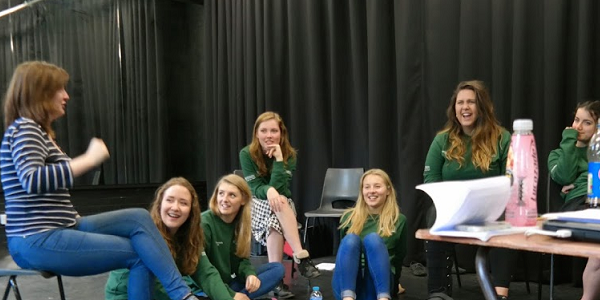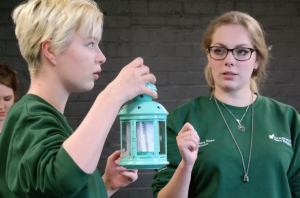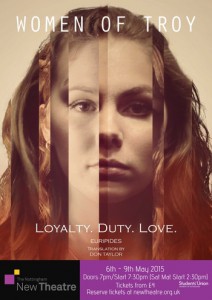
May 5, 2015, by Oliver Thomas
Women of Troy
The second part of Lynn Fotheringham‘s preview of a student production of Women of Troy, opening this Wednesday at the New Theatre on University Park campus.
With the New Theatre’s “Women of Troy” opening this Wednesday (6th May), I thought I’d whet your appetites with thoughts about some of the issues involved in staging this 2,500-year-old play. I’ll focus on two big issues: the Chorus, and the gods. (For a Greek-tragedy-expert’s opinion on translating these elements of Greek culture to the modern stage, see Simon Goldhill’s How to Stage Greek Tragedy Today.)
For director and producer Page and Eden Phillips Harrington, practical problems with timetabling rehearsals around student schedules led them to set a maximum of eight rather than twelve for the Chorus. Then there were aesthetic decisions: should the Chorus sing, dance, speak in unison, or speak individually – and at what points? In the television productions of Don Taylor (whose translation they are using), the only music was background-instrumental; setting his lines to music wouldn’t be easy. But the Greek tragic chorus sang – in fact Renaissance opera was invented in an attempt to revive this art form. Could songs be found that fit the mood? Musical Director Lucy Price explains: “I wanted songs that the audience may be vaguely familiar with, to help them connect emotionally with the play, but not know so well as be able to place them. So I searched soundtracks of recent films for haunting tunes to arrange.”
 That still left decisions to be made about the words in the text. Page says: “I do like it when people talk in unison, and then there’s this ‘Greek’ moment.” But most actors have little experience with this kind of delivery; it takes a lot of work. At the same time, “they’re representing so many people, they’re not just representing one voice” – so unison isn’t the whole story. How to have the Chorus represent both unity and diversity? That was the challenge they set themselves.
That still left decisions to be made about the words in the text. Page says: “I do like it when people talk in unison, and then there’s this ‘Greek’ moment.” But most actors have little experience with this kind of delivery; it takes a lot of work. At the same time, “they’re representing so many people, they’re not just representing one voice” – so unison isn’t the whole story. How to have the Chorus represent both unity and diversity? That was the challenge they set themselves.
All Greek tragedies have a chorus; not all Greek tragedies put the gods on stage. In “Women of Troy”, they would be easy to cut (and have been in many productions), as they only appear in the prologue. In an earlier blogpost, I mentioned that this production is keeping them. Page points out that the play’s characters are always talking about/to the gods: “if you cut the prologue, they’re just talking to the air.” The gods are also important, says Eden, as narrators – both of things that have happened and things yet to come. Watching a run-through last week, I was reminded how many later comments resonate – without the speakers’ knowledge – with the revelations of the gods. But how will this production make the gods as real for the audience as for the characters, but still mysterious entities beyond their ken? Well, some things shouldn’t be spoiled: you’ll just have to book tickets at the New Theatre website to find out.
 Please also consider filling in my on-line questionnaire. Very little audience-research has been done on productions of Greek tragedy; I’m interested in the views of people with any degree of prior knowledge, from none to lots!
Please also consider filling in my on-line questionnaire. Very little audience-research has been done on productions of Greek tragedy; I’m interested in the views of people with any degree of prior knowledge, from none to lots!
Image credits: (c) Alix Gabaude, shadow director of the production.
No comments yet, fill out a comment to be the first

Leave a Reply